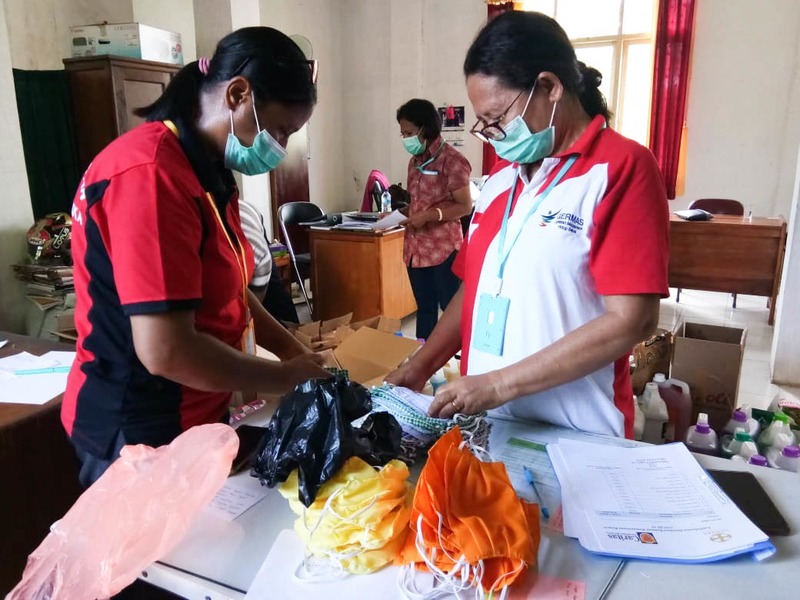On World Humanitarian Day 2020, Caritas Internationalis draws attention to the role of local communities as actors of immediate solidarity and calls for greater support to local civil society organizations, especially faith-based ones, which around the world are supporting, helping and empowering local communities.
Every year on August 19th – the day when in 2003 a bomb attack on the Canal Hotel in Baghdad, killed 22 people, including the UN chief humanitarian in Iraq Sergio Vieira de Mello – the World Humanitarian Day recognizes the work of those who promote the dignity, the protection and the welfare of vulnerable people around the world.

Local Caritas in Flores, Indonesia distributes masks to prevent the spread of COVID-19. Photo by Caritas Indonesia
In 2020, this day is celebrated in a context of globalized COVID-19 pandemic and shortly after the Lebanon explosion which will remain engraved in the minds of the international community. At this historic moment, the international humanitarian system is being tested like never before, and humanitarian missions at the global level are bringing help to 1 in about 45 persons around the world.
“On this day, the international community recalls the generosity of heart of thousands of humanitarian workers, of the poor and above all the survivors of the disasters who in hope aspire to live in dignity”, says Aloysius John, Secretary-General of Caritas Internationalis, which is the second-largest civil society catholic network and is present in almost all the countries across the world.
Local communities are first responders
An important part of the work of Caritas Internationalis – a confederation of 162 members – is to foster the empowerment of local communities, including in the field of humanitarian aid. “Defending, serving and accompanying the poorest communities especially at the time of disaster is the mission of Caritas Internationalis and its key role is to help people to help others,” John adds, underlining how COVID-19 pandemic has seen local communities as the main actors in the response to the humanitarian emergency.
“At a time when the disasters are getting to be more and more complex and the sufferings are high, the first support is given by the local communities which are better placed to bring appropriate help to the affected. They are to be recognised in the first place as actors of immediate solidarity.”
Even today when COVID-19 is creating havoc in different parts of the world, Caritas, through local communities is highly engaged in motivating and mobilizing community members to bring support and help to those who are vulnerable and also to build awareness around the danger of COVID-19 showing them how to avoid contamination. They have shown the importance of being autonomous in taking quick action in responding to the pandemic.
Localization of humanitarian aid
Caritas fully supports the localization of humanitarian aid and works to provide local communities with the know-how and the means they need to enable them to respond to humanitarian emergencies autonomously. “This World Humanitarian Day must lead us to innovation in humanitarian response wherein governments and international aid community must focus on the empowerment of the local civil society organizations, especially faith-based organizations which are present with local communities. At a time when the localization agenda is being introduced, it is vital that enough means are given to the civil society organizations to empower the local communities and prepare them for the humanitarian response in autonomy,” says Aloysius John.
Caritas Internationalis, on this World Humanitarian Day, urges the governments and international aid community to urgently:
-
allocate local funds especially to the empowerment of the local civil society organizations and their basic structures;
-
allocate special funds for the empowerment of the local communities and enable them to take the appropriate action at times of disasters;
-
ensure the protection of the humanitarian workers as well as the protection of the interests of local communities.



